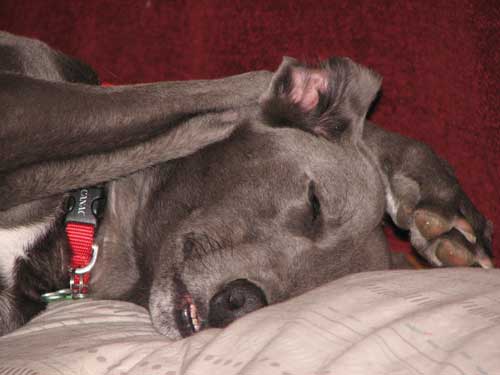Frequently asked questions about greyhounds
Here is a quick greyhound faq - just a few questions that people often ask when considering adopting a retired greyhound.

Do greyhounds make good pets?
Yes, greyhounds can make the most wonderful pets.
What is the life expectancy of an adopted Greyhound?
They have a life expectancy of 12 years or more and can be retired from racing at 18 months to five years of age.
Why do Greyhounds have to wear muzzles when racing?
To protect them from injuring one another during the excitement of the chase and to help determine the outcome of a photo-finish race.
Will my greyhound be house trained?
There are of course never any guarantees, but because they are "turned out" regularly to relieve themselves during their life at a kennels, they usually become accustomed to going outside for this purpose. You must show them what is expected but they learn quickly, and there are not usually too many mishaps.
Where should my greyhound live?
Greyhounds are not suited to outdoor life, they have very little body fat and a thin coat. They prefer an indoor environment, and a soft bed they can call their own.
Should I keep my greyhound on a lead?
Extreme caution should always be taken when letting your greyhound off its lead. They are born to run, and could well run straight onto a road. They should be well used to being walked and exercised on a lead, but it is such a wonderful sight to see them fly.
What is the normal size of a Greyhounds?
Most Greyhound males stand 26 to 30 inches tall at the shoulder, and weigh between 65 and 85 pounds. Females stand 23 to 26 inches tall at the shoulder and weigh 50 to 65 pounds.
What colour varieties are available?
Coat colours can range from black to white and almost anything in between. The name does not originate from the animal's colour, but from its history. There are several trains of thought as to how they got their name.
Can Greyhounds swim?
A lot of people believe that they cannot swim because of the way they are built (top heavy) and their low body fat that they cannot swim. Some greyhounds make excellent swimmers and others do not. Never let your dog near water unsupervised.
Another strange anomaly is that so many greyhounds are unwanted, yet they are one of the breeds at greatest risk of being stolen.
Never leave your greyhound tied up outside a shop - or in a car alone.
Adverts by Google
